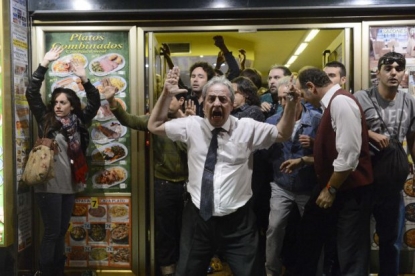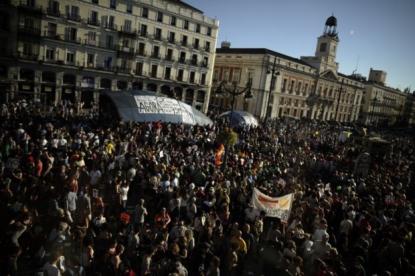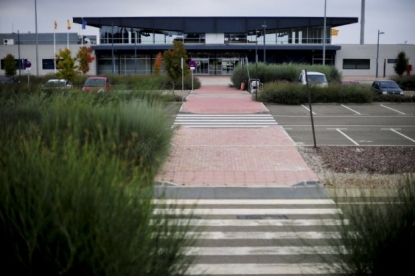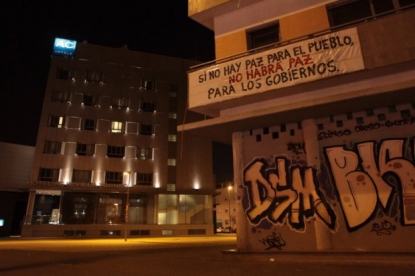Spain's crisis: Noisy helicopters, silent airports
AFP Madrid correspondent Katell Abiven has been covering Spain for the past four years, coinciding with an unprecedented slide of the Spanish economy from boom into deep crisis. As she prepares to join AFP’s Latin America team in the Montevideo regional hub, Katell looks back at the Spanish economic collapse.
MADRID, June 24, 2014 - I have worked in Madrid for four years. When I first got here, the unemployment rate was just breaking through the 20-percent barrier, causing shockwaves in the country. As I get ready to leave Spain in July, the jobless rate is stuck at 26 percent, an all-time record, but by now it feels like everybody has gotten used to it.
Within those four years Spain has understood that it’s sinking ever deeper into crisis, and more and more room is given in news programmes to the economy, with focus on hitherto obscure topics, like bond market risks or dodgy bank loans.
Beyond reporting the data, our job has been to show the suffering of the population, in social, financial and psychological terms.
Even if there's now talk of a recovery, those four years were, more than anything, crisis years that can be described like this:
"Tacatacataca"
When I first got here in July 2010, I had the feeling that people protested very little in Spain, no matter the circumstances. I bought into the cliche of Spanish fatalism. But then the crisis came and things changed.
There were the ‘Outraged’ (the Indignados) in May 2011, a popular movement that sprang to life thanks to social networks, and then the multi-coloured ‘Tide’ movement -- green for education, white for health, purple for the right to abortion -- started flooding the streets of Madrid with several demonstrations per week.

A waiter in Madrid bars police from his restaurant after "Indignados" demonstrators sought refuge there. (AFP Photo/Pierre-Philippe Marcou)
And that's when the police helicopter, charged with observing every protest, made its first appearance. We all got used to hearing its rotor noise above our heads.
Sometimes it hovered just one night in the week (Spanish people usually demonstrate late in the day). Sometimes three or four days in a row. During the camping campaign of the ‘Outraged’ of the Puerta del Sol, its noise filled the sky continuously for months.
The helicopter became a gauge for social protests, and I often found myself listening out for it to get an idea of how intense any given movement was likely to be.
For a laugh, an anonymous Twitter user created an account, @putohelicoptero, with a description that is loud and clear: "taca tacatacataca tacatacataca tacatacataca tacatacataca tacatacataca tacatacataca tacatacataca tacatacataca tacatacataca".
Today, it has 8,000 subscribers.
Angry civil servants
One personal experience brought home to me the extent of social discontent. When my son was born in December 2012 I had to do quite a bit of paperwork to get him registered in the Spanish system.
First, the registry office. The building's walls are covered with protest messages, inside and out, against a government plan to raise legal and administrative taxes.
In the Social Security office a civil servant tells me that I, as a journalist, have a duty to write about the injustices committed against public-sector employees whose salaries were first cut, and then frozen for several straight years.
 Demonstration by the ‘Outraged’ on Puerta del Sol in Madrid (AFP Photo / Pedro Armestre)
Demonstration by the ‘Outraged’ on Puerta del Sol in Madrid (AFP Photo / Pedro Armestre)She says her salary is just 850 euros per month, that she lost her Christmas bonus and that she probably won’t be able to afford Christmas gifts for her kids. She’s disgusted, she says, and remarks bitterly that “under Franco, things were tough but at least we had enough to eat.”
Finally, there’s the pediatrician, wearing a button ‘Let’s save public health’ who tells me that no, my son cannot get a chickenpox shot like his big sister, because the health service won’t cover the cost. She shakes her head disapprovingly.
The same story for a meningitis shot, but because of the risks linked to that illness, she strongly advises me to buy the vaccine myself, out of my own pocket. Three doses at 75 euros each, a sum that’s out of reach for many Spaniards. At least I’m lucky enough to be covered by my French complementary health insurance.
Airport desperately seeking passengers
When I arrive at the Huesca airport, near the Spanish Pyrenees, accompanied by photographer Josep Lago and video reporter Virginie Grognou, the atmosphere is apocalyptic. No cars in the car park, not a soul in the terminal.
It’s strange to stroll through abandoned security gates, or step behind airline counters, to move about completely freely in a place that’s usually brimming with security.
 The Huesca airport, where no regular flights land. (AFP Photo / Josep Lago)
The Huesca airport, where no regular flights land. (AFP Photo / Josep Lago)The only people we see are security agents, who won’t talk to us, preferring to retire to their offices, and cleaning staff.
During the boom years Spain, with the help of EU cash injections, built airports all over the place, but now most of them lack the passenger numbers necessary to be profitable. Many, like Huesca, are no longer used at all by commercial airlines.
I think back to the popular investigative TV programme ‘Salvados’, on the La Sexta channel, which, a few years back, ran reports for an entire evening about the excesses of the Spanish property bubble, which resulted in so many airports, motorways and high-speed train stations that nobody needs.
The programme’s name is a good summing-up of these past years that took Spain from dizzying growth to deep crisis: “When we were rich.”

'If there's no peace for the people, there's no peace for the government': A banner in Seville. (AFP Photo/Gogo Lobato)
In Sevilla’s Macarena neighbourhood a banner is fixed to an unfinished apartment bloc. 'Where there is no peace for the people, there will be no peace for governments,' it says. (AFP Photo/Gogo Lobato)


